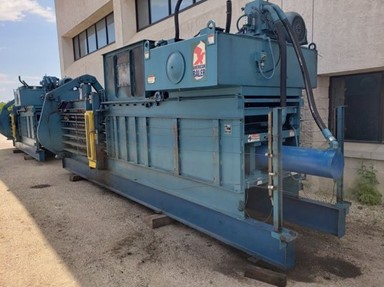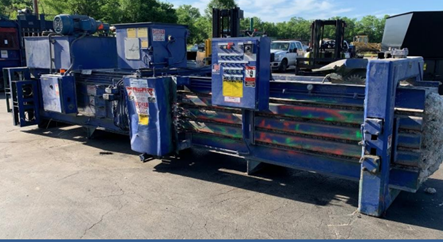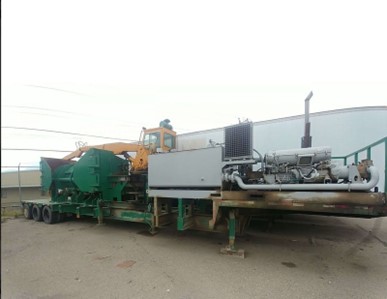Initially introduced over the late 1800s, balers are a special type of machinery which has existed for well over a century. The hay baler was one of the first baler types to be patented and was designed to assist with the heavy industrial growth of agriculture. Throughout the 1920s, the success of the hay baler design was noticed, and the first types of waste and recycling balers were patented. Fast forward to modern times, and balers have steadily progressed as an industrial tool widely used throughout a variety of industries for compacting all sorts of materials.
Within the following Surplus Record buying guide, we’ll cover some of the basics regarding how baler systems function and some of their primary purposes. Additionally, some tips and tricks will be provided to help ensure a smooth purchase process of new and used balers alongside some notes that buyers should be aware of when they are on the lookout for used industrial balers for sale.
What is a Baler and How Does it Work?
A baler is an industrial machine which plays an important part in the recycling process of different materials such as paper, metals, organic matter and wood. Balers are constructed of steel and utilize internal hydraulic rams to compress materials into compact and manageable sizes. Once the introduced material has been compacted down (into a tight cube), it can be stored neatly for a waste collector to come take the waste which is then disposed of.


Recycling Baler Types
Within the Surplus Record catalog one can view a range of Balers including:
- Horizontal Baler: Structured horizontally which proves excellent for mass production of waste materials with cost effective attributes.
- 2-Ram Baler: Also known as the dual baler, these machines house 2 hydraulic rams which produce additional power to the system. They are great for creating exceptionally dense bales and maximizing efficiency.
- DownStroke Baler aka Vertical Balers: A top loading unit that operates in a similar manner to the horizontal baler. Downstroke balers normally only produce one unit of waste (1 bale) at a time however, they take up less floor space than other models.
- Mobile Baler: With less capabilities and a lower power range, the mobile baler more than makes up for this with its portability. Mobile balers are perfect for compacting waste on the go. Typically used for logging.
- Paper and Corrugated Materials Balers: Paper and corrugated materials balers are machines designed to compress waste paper and corrugated cardboard into dense, compact bales.
- Scrap Baler and Scrap Metal Balers – Ferrous: Scrap balers, including those designed for ferrous metals (containing iron), are machines used to compress scrap metal into compact, manageable bales.




Balers vs Compactors
When managing waste and recyclable materials, businesses often choose between balers and compactors. Both machines streamline waste management but serve different purposes and are suited to different types of waste.
Balers
Balers are specialized machines used primarily for recycling purposes. They compress and bind materials like cardboard, paper, plastics, and metals into compact, easily transportable bales. Key advantages of balers include:
- Recycling Efficiency: Balers sort and compress recyclable materials, making them easier to handle and transport.
- Space Saving: Baled materials take up less space, which is crucial in facilities with limited storage.
- Revenue Generation: Recyclables processed by balers can often be sold, creating an additional revenue stream.
Balers are ideal for businesses that generate a significant amount of recyclable waste, such as manufacturing facilities, retail stores, and recycling centers.
Compactors
Compactors are designed to reduce the size of waste materials through compression. Unlike balers, compactors are typically used for non-recyclable waste. Key benefits of compactors include:
- Volume Reduction: Compactors reduce the volume of waste, which can lower disposal costs.
- Improved Sanitation: By containing and compressing waste, compactors help reduce odors and pests.
- Versatility: They can handle a variety of waste materials, including mixed trash and organic waste.
Compactors are best suited for businesses that produce large volumes of general waste, such as restaurants, hospitals, and shopping centers.
The choice between a baler and a compactor depends on the type of waste generated and the business’s waste management goals. Balers are more suitable for businesses focused on recycling, while compactors are ideal for general waste reduction and sanitation.
Uses and Applications
Balers are used for the high-density compression of various materials including, but not limited to:
- Aluminum
- Scrap steel
- Cardboard and paper
- Various plastics
- Steel cans
- Packaging foam
- Automobile parts
- Organic matter
Balers are commonly found and used within:
- Retail stores and shopping malls
- Supermarkets
- Restaurants
- Hotels
- Processing facilities
- Office and government buildings
- Schools and universities
- Recycling sites
- Warehouses and factories
- Manufacturing facilities
Important Considerations Before Buying a Baler
When shopping for a baler, there are several factors that can influence its performance for your situation:
- Space: Most balers will take up a lot of floor space. For many, this isn’t always a concern. However, if you are operating a smaller scale facility or plan to utilize a baler within a tight space, compact baler models will be more ideal.
- History of Maintenance: Like most machinery, baler systems need regular maintenance. Generally speaking, you can avoid heavy damage and costly repairs on your baler by ensuring that it has received routine maintenance throughout its lifespan.
- Size of the Machine: The size of the machine will determine the size of the bales produced by the baler. Similarly, the larger the machine, the more power it requires. If you’re a high-volume facility, a larger machine is generally the way to go.
- Quantity of Bales Produced: If you or your business require a certain output of bales produced per hour, some models will produce far better numbers with their output than others.
Surplus Record: Tips and Tricks
To assist further when searching for used balers for sale on our platform, we have attached our best tips and tricks:
- Make use of our Location Settings: At the top of the page, when on the list for balers, enter your desired location and you’ll be taken directly to what we have available in your area.
- Looking for an Auction?: On the listing page, select the blue checkbox on your right which says “Auction” and you’ll be taken to our available products for sale via auction.
- On a Budget?: Select the toggle “Sort by Relevance” and then click “Price low to high” to view our cheapest to most expensive products for sale.
- Don’t forget the Search Bar: Already know what you’re looking for? Utilize our search tab at the top of your page to find specific listings out of hundreds available.
Quick Access: Balers
- Baler Service Company | Missouri
- Alan Ross Machinery | Illinois
- Ex-Factory | North Carolina
Quick Access: Dealers Specializing in Recycling/Scrap/Waste Equipment
Quick Access: Industrial Baler Manufacturers
Our top manufacturers available at Surplus Record for used insulated and molded case circuit breakers include:
- Maren, American, and Balemaster (Paper and Corrugated Materials Balers)
- Harris (2-Ram Balers)
- PTR (Downstroke Balers)
- Balemaster, Marathon, Maren, and International (Horizontal Balers)
Need More Help? Or additional information about Industrial Balers? Head on over to the “Wanteds” section of our website and select “Buy” at the top and “General Equipment ” for the industry. Fill out the form and a dealer who specializes in Baler Machinery will get back to you ASAP. It’s free to do, and our dealers are happy to help!

